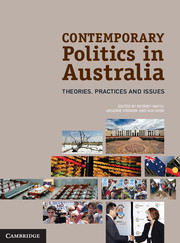Book contents
- Frontmatter
- Contents
- Tables and figures
- Contributors
- Acknowledgements
- Introduction
- I Contemporary Theories of Australian Politics
- Introduction to Part I
- 1 Democratic theories
- 2 Institutionalism
- 3 Behaviouralism
- 4 Critical theories
- 5 Discourse theories and post-structuralism
- 6 International political theories
- Part II Politics in Everyday Australian Life
- Part III Elections
- Part IV Participation and Representation
- Part V Inside the Australian State
- Part VI Contemporary Public Controversies
- Glossary
- References
- Index
Introduction to Part I
from I - Contemporary Theories of Australian Politics
Published online by Cambridge University Press: 05 June 2012
- Frontmatter
- Contents
- Tables and figures
- Contributors
- Acknowledgements
- Introduction
- I Contemporary Theories of Australian Politics
- Introduction to Part I
- 1 Democratic theories
- 2 Institutionalism
- 3 Behaviouralism
- 4 Critical theories
- 5 Discourse theories and post-structuralism
- 6 International political theories
- Part II Politics in Everyday Australian Life
- Part III Elections
- Part IV Participation and Representation
- Part V Inside the Australian State
- Part VI Contemporary Public Controversies
- Glossary
- References
- Index
Summary
Sometimes the study of Australian politics is described as being atheoretical and unreflective about the approaches that underpin analysis (Crozier 2001, p. 17). In this book, we deliberately foreground some of the major theoretical traditions and approaches that exist in and underlie Australian political inquiry. We do this for two reasons: first, we believe that political theory has a rich history and presence in Australia (Stokes, cited in Crozier 2001); and second, by focusing on these approaches we can better understand the diversity and distinctness of Australian political science.
Elsewhere, Gerry Stoker and David Marsh (2010, p. 3) have surveyed the field to show how each different approach to political inquiry ‘combines a set of attitudes, understandings and practices that define a certain way of doing political science’. We have included four of their seven approaches here to foreground the variety of mainstream and critical political science found in Australian scholarship: institutionalism, behaviouralism, critical theories such as feminism and Marxism, and discourse approaches. These approaches can be heuristic devices for students of political science to see and understand how different approaches will often lead to different research topics and questions. For example, taking an institutional approach will produce a focus on political structures, while adopting behaviouralism will concentrate on the agency of political actors.
- Type
- Chapter
- Information
- Contemporary Politics in AustraliaTheories, Practices and Issues, pp. 2 - 3Publisher: Cambridge University PressPrint publication year: 2012



